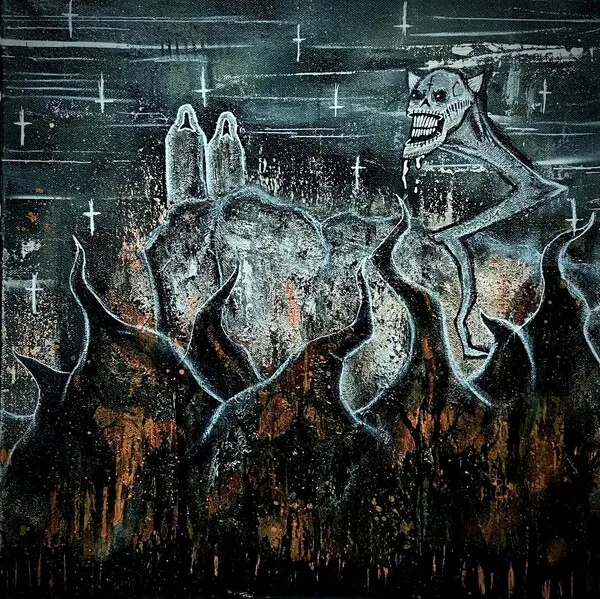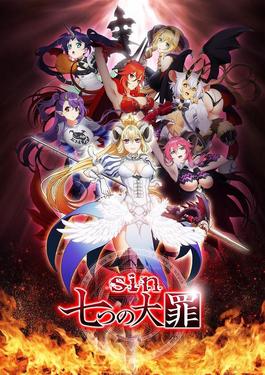“Seven Mortal Sins, also known as Sin: The 7 Deadly Sins (sin 七つの大罪, Sin: Nanatsu no Taizai), is a Japanese anime television series animated by Artland and TNK that aired from April 14, 2017, to July 29, 2017. It is an adaptation of Hobby Japan’s media franchise The 7 Deadly Sins (七つの大罪, Nanatsu no Taizai), which primarily consists of a series of fantasy figures.” —Ururihi, “Sin: Nanatsu no Taizai,” Wikipedia (retrieved January 24, 2024)
Freddie’s Inferno by Freddie Dredd
 “The title of the album, Freddie’s Inferno, is a reference to Dante’s Inferno, a poem written by Dante Alighieri in the 1300s which describes the journey through hell. The tracklist also mirrors the poem as each track is named after a circle of hell.” —Genius
“The title of the album, Freddie’s Inferno, is a reference to Dante’s Inferno, a poem written by Dante Alighieri in the 1300s which describes the journey through hell. The tracklist also mirrors the poem as each track is named after a circle of hell.” —Genius
Freddie Dredd’s songs in this album share the same names as many of the sins present in Dante’s Inferno.
“Comin’ from the underworldMy body holds a demonHeard you screamin’ for a breakI don’t think anyone could takeI’m a beast, I’m a foe, I’m the one you saw beforeDon’t be greedy with your life” –Freddie Dredd, “Greed”
Contributed by Nova Anastasia, Florida State University ’27
Law & Order: Special Victims Unit, Season 13, Theatre Tricks (2012)
“In the Law & Order: Special Victims Unit season 13 episode ‘Theatre Tricks,’ Dante’s Inferno was the chosen play of an interactive theatre group where an actress ended up raped on stage during the Second Circle (Lust).” —Wikipedia
Leonard Kress, “That Day We Read No More” (2019)
A vengeful sheering Great Lakes wind,
uprooting trees, flinging roof shingles—
split stumps and flayed branches. A whole dangle
of modifiers. Infinitives finding
syntax amid the wreckage. I can almost
make out the spoken scrawl, part malignant rant,
and part avowal, part warning and part advance
directive. Yet what I hear most is boast
when winds subside: Love led me to betray,
and the agony that betrayal once begot
afflicts me now, like you, who’ll stay
to hear my tale. You, like me, who sought
to authorize illicit love—you’re doomed
like some obsessive-compulsive, forever caught
in the act of betrayal. Forever damned.
Give me details, I demand, hoping
our stories do not match. There’s no stopping,
she says—Francesca, mother, who charmed
Paolo with her quizzing glance. I asked
my would-be lover to admit out loud
with certain sighs he wanted me. He held
his breath long as he could. And then, unmasked,
indifference and restraint abandoned, distance
obliterated—we agreed to read
together the tale of Lancelot’s romance
with his King’s wife Guinevere, and the bed
in which they found delight. That pleasure is
now pain—in inverse proportion to the deed.
Leonard Kress’s poem “That Day We Read No More,” a rewriting of Inferno 5, was published in The Orpheus Complex by Main Street Rag Press in 2009. It is available for purchase on the Main Street Rag website. The poem was featured in NonBinary Review #19, a 2019 collection of poems dedicated to Dante’s Inferno, available from Zoetic Press. Many thanks to the author for permission to publish the poem on Dante Today.
Elena Ferrante, Storia del nuovo cognome (2012)
 “Ma adesso, a Ischia, aveva incontrato Lila e avevo capito che lei era stata fin dall’infanzia—e sarebbe stata sempre in futuro—il suo vero unico amore. Eh sì, era andata di sicuro a questo modo. E come rimproverarlo? Dov’era la colpa? C’era, nella loro storia, qualcosa d’intenso, di sublime, affinità elettive. Evocai versi e romanzi come tranquillanti. Forse, pensai, aver studiato mi serve solo a questo: a calmarmi. Lei gli aveva acceso la fiamma in petto, lui per anni l’aveva custodita senza accorgersene: ora che quella fiamma era divampata. Cos’altro poteva fare se non amarla. Anche se lei non l’amava. Anche se era sposata e quindi inaccessibile, vietata: un matrimonio dura per sempre, oltre la morte. A meno che non lo si infranga condannandosi alla bufera infernale fino giorno del Giudizio.” –Elena Ferrante, Storia del nuovo cognome (p. 237)
“Ma adesso, a Ischia, aveva incontrato Lila e avevo capito che lei era stata fin dall’infanzia—e sarebbe stata sempre in futuro—il suo vero unico amore. Eh sì, era andata di sicuro a questo modo. E come rimproverarlo? Dov’era la colpa? C’era, nella loro storia, qualcosa d’intenso, di sublime, affinità elettive. Evocai versi e romanzi come tranquillanti. Forse, pensai, aver studiato mi serve solo a questo: a calmarmi. Lei gli aveva acceso la fiamma in petto, lui per anni l’aveva custodita senza accorgersene: ora che quella fiamma era divampata. Cos’altro poteva fare se non amarla. Anche se lei non l’amava. Anche se era sposata e quindi inaccessibile, vietata: un matrimonio dura per sempre, oltre la morte. A meno che non lo si infranga condannandosi alla bufera infernale fino giorno del Giudizio.” –Elena Ferrante, Storia del nuovo cognome (p. 237)


